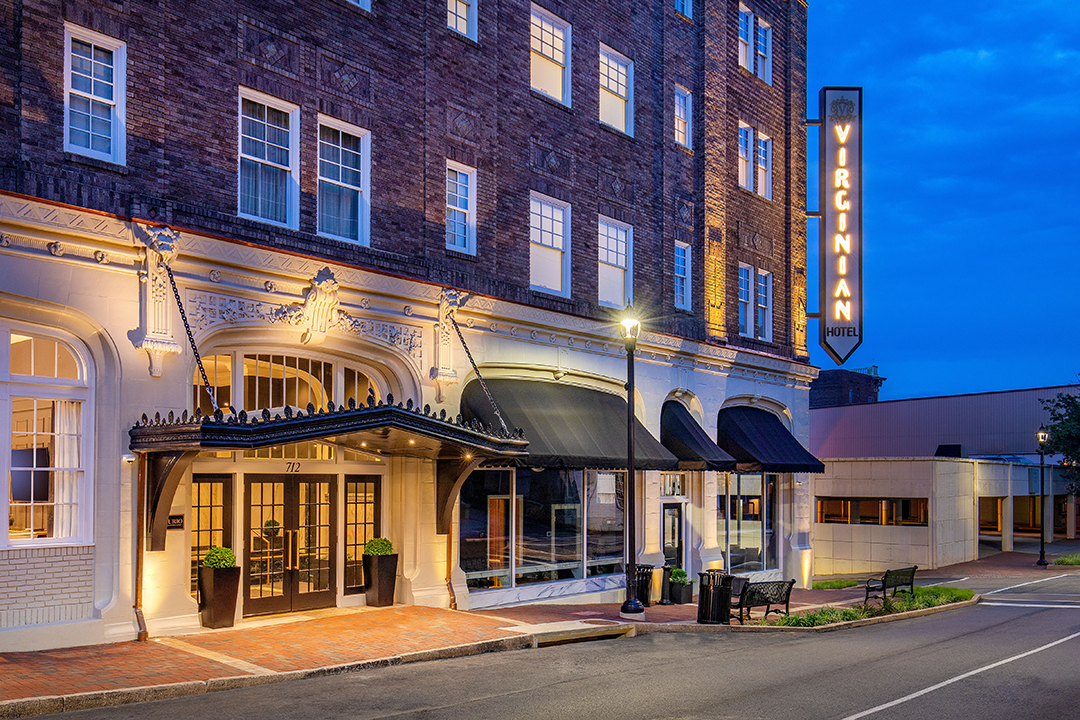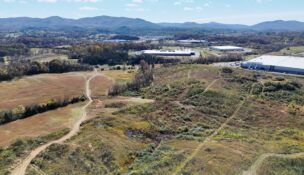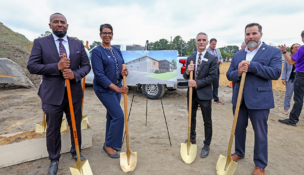Slow and steady
Lynchburg’s growth may lag, but signs are positive

Megan Lucas, CEO of the Lynchburg Regional Business Alliance, says she’s encouraged by more businesses inquiring about locating projects in the Lynchburg area. Photo by Will Schermerhorn

Megan Lucas, CEO of the Lynchburg Regional Business Alliance, says she’s encouraged by more businesses inquiring about locating projects in the Lynchburg area. Photo by Will Schermerhorn
Slow and steady
Lynchburg’s growth may lag, but signs are positive
The Lynchburg region has seen the slowest job growth of any metro area in Virginia over the past three years, according to economic analyses, and it typically has a higher unemployment rate than the state average. But there’s more to the story, some officials say.
For instance, the Lynchburg region saw 23 inquiries from economic development prospects in 2023, and half of those companies made site visits, says Megan Lucas, CEO of the Lynchburg Regional Business Alliance.
While she acknowledges that none of those businesses have chosen Lynchburg for their projects yet, the level of activity is an indicator for future growth, says Lucas, who joined the alliance in 2016 and before that was head of the Region 2000 Partnership, an economic development organization serving Lynchburg and the surrounding counties of Amherst, Appomattox, Bedford and Campbell.
“The more we generate awareness and RFPs, the more we generate capital investment and jobs, so that’s really important,” she adds. “When I began here 10 years ago, those numbers were at zero. It is a united front of local economic developers, municipalities and our private-sector investors that are making this happen.”
And, more importantly, the past year has brought some major economic development announcements that are expected to bring hundreds more jobs to the Lynchburg region within a couple years.
Lucas is particularly bullish about “the thriving urban core with a dynamic rural ring” that characterizes the region, but she cautions that breakneck economic growth is not necessarily the most beneficial goal for the area.
“We will continue to see slow, steady growth, marching forward,” she says. “We believe in smart growth and are open to focusing on smart growth principles and strategies. We are not throwing the barn doors open and screaming for everybody to come in in a fast, unorganized manner.”
Positive signs aside, the Lynchburg metro- politan statistical area’s unemployment rate was 3.4% in November 2023, exceeding the state’s rate of 2.9%, according to the Virginia Employment Commission.
Sector-based struggles
Lynchburg’s unemployment numbers aren’t a surprise. Over the past four years, the region has experienced major job losses across its three largest employment sectors: education and health; trade, transportation, and utilities; and manufacturing.
Joe Mengedoth, a regional economist with the Federal Reserve Bank of Richmond, reports that manufacturing employment in the Lynchburg area has grown only 3.5% above pre-pandemic levels, while education and health services employment is 1% below where it was in February 2020. Sectors that have been flourishing most throughout the commonwealth — information technology and professional and business services — are underrepresented in Lynchburg, leaving the city and its surrounding localities unable to reap the rewards of that growth.
“[The] Lynchburg metro area is the slowest to recover since the pandemic,” Mengedoth says.
However, there’s a wrinkle even in the stats from the state and Old Dominion University’s Dragas Center for Economic Analysis and Policy, which produces the annual State of the Commonwealth report on Virginia’s economic outlook.
Lynchburg’s largest employer, Liberty University, is not included in employment statistics produced by the state, because of a religious exemption that allows the private evangelical Christian university to not participate in unemployment insurance. Employers paying that insurance, however, submit regular data that the U.S. Bureau of Labor uses to track jobs numbers.
Dragas Center director Robert McNab, who is also chair of ODU’s economics department, says Dragas’ economic report, which doesn’t include Liberty’s 8,000-plus workers in Lynchburg’s employment data, still captures Liberty’s activities in other ways and paints an accurate portrait of Lynchburg’s important trends.
Liberty officials, however, beg to differ. Liberty General Counsel David Corry, who previously served on the Lynchburg Regional Business Alliance board, says the university has been trying to get the state to count Liberty employees in their statistics, which would improve the city’s employment numbers.
“It made the Lynchburg region look terrible for a long time because our employees were never counted,” Corry says. “We look poor, we look underemployed, and that just wasn’t the reality.”
While the state hasn’t changed the way it collects employment information, Richmond-based Chmura Economics & Analytics included Liberty’s employment data in a December 2023 study conducted for the regional alliance. In that report, Lynchburg’s employment level stood at 111,696 in the third quarter of 2023, about 1,800 jobs below its pre-pandemic peak. Those results would double the region’s growth rate, according to Chmura Economics CEO and Chief Economist Chris Chmura.
Lucas agrees that “we need to do everything we can to make sure that regional data includes our largest employer. Liberty is our region’s economic engine. … As it relates to communicating an accurate regional economic picture, their data needs to be included.”
Lynchburg’s slow economic growth is best understood in the context of the state’s economy, McNab says. ODU’s 2023 State of the Commonwealth report found that Virginia’s economic growth was slower compared with North Carolina, South Carolina and Florida, and that Virginia’s growth is mostly centered in larger population centers along interstates 95 and 64, at
a distance from Lynchburg.
“The problem we’re seeing in the commonwealth is that people, incomes and activities are increasingly concentrated in the urban crescent of Northern Virginia, Richmond and Hampton Roads,” he says. “It’s really hard to move the needle when the economic center of gravity of Virginia continues to move towards Fredericksburg.”
Although McNab’s data showed Lynchburg with a 3.6% unemployment rate in December 2023, a 0.1% increase from December 2022, this isn’t the bad news it may seem at first, he says, because total nonfarm employment also rose 0.5% in the same period.
“This is a point of good news for Lynchburg,” McNab says. “It makes me suspect that real GDP growth in Lynchburg ticked up in 2023 because we see growth in the labor force and individual employment. And that tends to suggest that economic activity picked up.
“Across the commonwealth, we have relatively low unemployment rates, and we have had job growth in 2023 across metro areas, including Lynchburg,” he adds. “We’ve also seen rises in real wages and a recovery in median household incomes from the bout of inflation in 2022. This suggests to me that the prospects for growth in 2024 are broad.”
Growth on the horizon
Other good news for the region included several major economic development announcements last year, led by nuclear energy company Framatome’s planned $49.4 million expansion in Lynchburg, which is set to create an estimated 515 jobs, announced in December 2023.
Centra Health launched a $500 million modernization of its Lynchburg hospital campus in May 2023, with a completion date set for fall 2027, and also in May 2023, power transformer manufacturer Delta Star announced a $30 million expansion of its corporate headquarters and plant in Lynchburg that is expected to create 149 jobs. And last October, lithographic print and custom envelope manufacturer Parkland Direct said it plans to expand its Bedford County facility, a $10 million investment creating an expected 41 jobs.
The Centra and Delta Star projects are on track and on budget, Lucas says, while Parkland Direct has not yet started construction, although it’s hiring more staff now.
These announcements came on the heels of earlier growth, including CloudFit Software’s recent completion of its $5 million renovation of downtown Lynchburg’s historic Carter Glass building to serve as its headquarters, bringing 78 jobs to the city. Also, Liberty University has revamped the River Ridge Mall, which it owns, through a $60 million renovation begun in 2019 — in contrast to many enclosed malls nationwide that have languished in recent years.
Also, says Lynchburg’s director of economic development, Marjette Upshur, there are more projects in the pipeline.
Gov. Glenn Youngkin announced last September that Lynchburg’s Economic Development Authority would receive a $500,000 state grant to transform a one-story former A&P grocery store downtown at 400 12th St. into a four-story, mixed-use building containing 10,000 square feet of retail space and 28 apartments. According to Upshur, residential tenants are expected to move in beginning in April or May, and the commercial space is scheduled for completion around September.
“We are currently working on several active competitive projects due to our efforts in site development and partnering with the private sector to market existing industrial and commercial buildings,” adds Upshur.
The LRBA also led a consortium to apply for a $500,000 grant last fall from the U.S. Economic Development Administration’s Tech Hubs program. The group didn’t win the grant, but Lucas notes, “we are continuing to build out our strategy” for creating the Nuclear Industrial Technology Commercialization Hub, or NITCH. The alliance has applied for a GO Virginia grant to assist with the initiative, which focuses on beefing up the area’s nuclear manufacturing industry and its workforce.
GO Virginia’s Region 2 allocated $240,192 to the alliance in March 2023 to create The Center for Entrepreneurship, which centralizes entrepreneurial support services at the alliance’s downtown Lynchburg office. Surrounding localities dedicated $187,035 in matching funds to support the project.
“At the Lynchburg Regional Business Alliance, our focus is commerce and free enterprise,” Lucas says. “We spend our time in that space working for the good of all businesses and industries that want to grow and be successful here. We always come down on the side of free enterprise and capitalism.”
The LRBA’s approach and the region’s relatively slow post-pandemic economic recovery have caused a minor amount of hand-wringing, and Bedford County conservative activist Isaiah Knight requested last September that the governing bodies of Lynchburg and Bedford and Campbell counties defund the alliance because its website once had a page devoted to diversity, equity and inclusion (DEI), although it has since been taken down, according to a September 2023 report in Cardinal News. Lucas explained at the time that the page was removed because many of its links were broken.
Last year’s kerfuffle did little to dampen the organization’s determination to continue its mission to promote business in Lynchburg, and most local officials remain in support of the alliance.
Asked about diversity initiatives earlier this year, Lucas emphasized LRBA’s broad-based outreach: “We have round-tables, meetings and a diverse membership in the Lynchburg Regional Business Alliance. We have diverse engagement. We walk the walk and talk the talk. It’s part of our philosophy, and we are engaged in commerce for everybody.”
Deputy Editor Kate Andrews contributed to this report.
Lynchburg at a glance

Settled in 1757 on the James River in the foothills of the Blue Ridge Mountains, Lynchburg lies at the intersection of U.S. routes 29 and 460 alongside neighboring Amherst, Bedford, Campbell and Appomattox counties. Lynchburg’s economy is dominated by education, health care and manufacturing. It is home to Liberty University, the city’s largest employer, as well as Randolph College, University of Lynchburg, Virginia University of Lynchburg and Central Virginia Community College.
Population
79,287 (2022)
Top employers
Liberty University
Centra Health
Lynchburg City Schools
City of Lynchburg
Framatome
Major attractions
Visitors can soak up history and culture at the free Lynchburg Museum; Point of Honor historic plantation; and Old City Cemetery, a 27-acre historic public garden. Families can head to Amazement Square children’s museum. Outdoors lovers will enjoy the James River Heritage Trail along the James River. Westward in neighboring Bedford County, visitors can find waterfront recreation at Smith Mountain Lake and great hiking and views at the Peaks of Otter.
Top convention hotels
Bella Vista Hotel & Suites 164 rooms, 7,200 square feet of event space
The Virginian Lynchburg, Curio Collection by Hilton 115 rooms, 6,753 square feet of event space
Hilton Garden Inn Lynchburg 126 rooms, 2,880 square feet of event space
La Quinta Inn & Suites by Wyndham Lynchburg at Liberty Univ. 120 rooms, 1,539 square feet of event space
Courtyard by Marriott Lynchburg 90 rooms, 637 square feet of event space
Boutique/luxury hotels
The Carriage House Inn Bed and Breakfast 49 rooms, 8,400 square feet of event space
The Craddock Terry Hotel & Event Center 44 rooms, 4,000 square feet of event space
Acorn Hill Lodge 10 rooms, 1 meeting room
Notable restaurants
Shoemakers American Grille American
shoemakersdining.com
The Water Dog Bar and grill
thewaterdog.com
Isabella’s Italian Trattoria Italian
isabellasitalian.com
The Dahlia Seafood
thedahlialynchburg.restaurant
RA Bistro American
rabistro.com


















